#source: pathologising
Explore tagged Tumblr posts
Text
disclaimer that I don't like the idea of openly assuming things about strangers' identities or their personal lives, especially when you're catching a glimpse of only one part of them they choose to share in the public eye. but it Is very funny when you're reading or watching some interview with a famous person, and they say things that make you do this one comic:
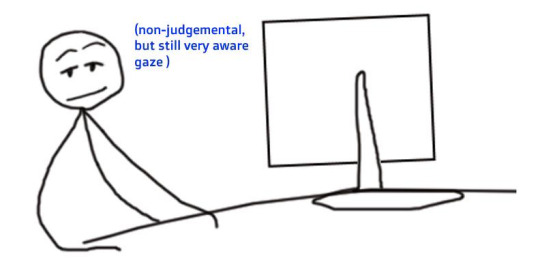
#art source drememoto#''yeah I like my routine just right and I don't like when anything changes it lol I'm just kinda quirky that way!#I hate certain noises and I have very intense obsessions about things and I'm not so good at talking to people''#and you're like uh huh. uh huh. uh huh.#I enjoy reading those things tho. bc even if there's ultimately nothing to pathologise it's still like. aw hey me too#tho older ones from now deceased people who likely never had the opportunity to discover anything about themselve are quite heartbreaking.#especially if they come across as distressed or uncomfortable with aspects of their personality#then you get stuff like stewart copeland openly going ''he's probably not as autistic about it as I am'' when describing his ear for drums#which is really funny to me#idk if he's saying that in a more ''oh I'm so ocd lol!'' or a sincere way but I'd like to think it's the latter bc it was so blunt
52 notes
·
View notes
Note
Hey, I've been delving into anti psychiatry readings but one thing always stands out to me: if there is no underlying disease behind a depressive state, for example, how does that new paradigm not end up placing the blame on the patient? I ask in good faith as I still don't have a clear answer on that regard, and would like to have better conversations about this topic that don't end when people tell me of a close relative with depression who has seemingly had a life free of traumas that could otherwise present as depression.
-materialist (marxist) anti psychiatry identifies the root 'cause' or basis of psychological experiences in the economic and material conditions of existence. depression or other forms of distress, just like other affective states, derive fundamentally from the world we live in, our political situation, the material alienation of estranged labour that underlies 'alienation' the psychological state. this doesn't mean that resolving the contradictions of capitalism (that is, workers' revolution) will magically eliminate all sources of distress, depression, or other currently pathologised experiences. however, it would certainly resolve / eliminate some distress for some people; additionally, it is the only way to overcome the capitalist paradigm that values people by their adherence to a normative standard of ability, which is what renders depressed people (for example) economically marginalised 'failed citizens'
-keeping the above in mind, i would question whether there is really such thing as a person who 'has no trauma' ie, has no material basis for alienation, depression, or distress. capitalism is an estranging system, including for the owner class (though of course this occurs in a different way to the labouring class, and i am not suggesting that the bourgeoisie are the 'victims' of capitalism or some such)
-none of the above is mutually exclusive with the role that an individual's neurobiology plays in their subjective or psychological state. like any base/superstructure phenomenon, the relationship is dialectical, with the material base generally dominating, but both acting on and being affected by superstructural phenomena. economic and material conditions lead to subjective experiences such as depressions; these experiences are also instantiated in, reacting to, and reacted upon by the physiological processes in the brain/body. however, when we say that depression (for example) is not a disease we mean that there is no biological entity---no infectious pathogen, no 'chemical imbalance', no organic lesion, no anatomical defect or physiological malfunction---that is identifiable as a single cause or correlate of depressed states, nor will there ever be; the psychiatric label is a heuristic catch-all applied to a constellation of experiences (symptoms) that are varying degrees of disagreeable to individuals (patients) as well as to medical and state authorities
-i think it's overly credulous to the psychiatric profession to assert that calling something a disease means that no one can 'blame the patient' for it. in fact i would say it would be difficult to name a disease that doctors, state authorities, and society at large does NOT blame on patients
-i also think it's overly credulous to the psychiatric profession to assert that there is a dichotomy between neurobiological diseases and things that are individual faults or failings. in fact i would posit that most subjective experiences, including of distress, are neither
444 notes
·
View notes
Text
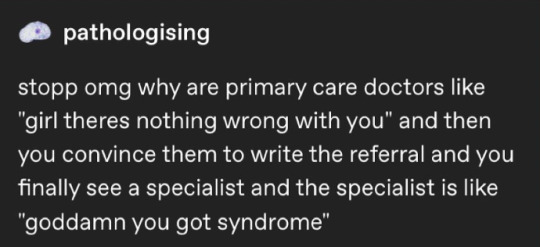
Source: @pathologising
#chronic illness#chronically ill#chronic illness memes#autoimmune#autoimmune memes#autoimmune disorder
283 notes
·
View notes
Note
no i agree incest would warp someone's psyche but the way i've seen it disscused, as the targaryens being incapable of regular family relationships and being normal about their family members is not true and as you pointed out we also see incest among the other westerosi houses. it's another things that gets treats as unique to the targaryens when the only difference is how (some) forms of incest are sanctioned/allowed. incestues abuse and inappropriate relationships exist among other houses, you don't need to look any furher than jaime and cersei.
cw: csa mention
yes, i'm familiar with that line of analysis. the general argument is that they're born into a family that practices institutionalised incest, which means they're raised to view siblings as potential sexual partners, something that complicates the possibility of having 'normal' familial relationships—which is correct, but i also agree that you can't make sweeping claims about the psychology of every single targaryen using this reasoning. and people identify this as a problem unique to the targaryens because they're not considering what enables and motivates their incest practices, there's some gesturing at it as a cyclical issue but ultimately they're also being framed as sexual deviants, individually pathologised - which is not all that different from attributing child sexual abuse to the spectre of the pedophile, as a rare perversion and not something that is enabled by the way children are rendered structurally (legally, economically) disempowered. and the reason people construct a unique pathology for the targaryens is because they don't view them as actors within westeros's feudal patriarchy just like every other great house, they view them as valyrians. which is why their motivations for everything they do in the books have to be sourced back to the freehold. and i won't deny that there's a special narrative thread of family magic and curse running through their line (my brothers dreamed of dragons too, and their dreams killed them, every one.), you are being invited to look at them through that lens, that there's a specific burden and tragedy but also awe and glory in being a targaryen. they've socially constructed a divine self-mythology because they're kings and your kings are also your gods, but it's a politically convenient lie they consciously tell their subjects (there are very few targaryens who actually, wholeheartedly believe in the superiority of their own valyrian race), because ultimately they're just as human as any of them and just as subject to and motivated by social forces.
so why is the incest happening, because marriage is a way of forging political alliances and in turn accumulating military power during both times of peace and war. military power for targaryens means dragons, you don't give the lannisters a dragon (it goes deeper than that, dragons are their symbols of legitimacy and authority you simply cannot give another house a dragon, it undermines their entire image as sovereigns), so you keep your dragonrider daughters within the family structure—just as daughters from other great houses are commodities on the marriage market, exchanged for political power and the propagation of bloodlines. materially there is no difference between the two situations (there's a good point re avenues of escape from abuse just not being there in incestuous targaryen marriages, but i've covered it here and concluded that it's also not really available for exogamous marriages), because this is how westeros's feudal patriarchy works. marriages between very young girls and much older men are normalised, we see it happen multiple times in the main series but there's this line in mystery knight which has stuck with me, because it was a detail casually dropped with no objections attached by dunk, the second closest thing to a true knight in the books: "The girl was fifteen and freshly flowered, her lord husband fifty and freshly widowed."
in westeros everyone is match made from birth, if not immediately from birth then well before the age of majority (catelyn was betrothed to brandon at twelve), being uniquely horrified by the targaryens also matchmaking their kids at a young age does not make sense to me. "they are raised into" yes well eleven year old sansa was also raised into internalising this: "I love him, Father, I truly truly do, I love him as much as Queen Naerys loved Prince Aemon the Dragonknight, as much as Jonquil loved Ser Florian. I want to be his queen and have his babies." and i brought up the greyjoy brothers because that's a clear case of non targaryen incestuous abuse made possible because of the way power flows from the patriarch, to whom the younger sons defer to, are sworn to obey—the same power hierarchy that enables aerion's sexual abuse of egg. the forces at play here are the same, yet people will seek to identify the latter as the consequence of the targaryens' uniquely fucked up child rearing practices and psychology.
all marriages in westeros are founded on those principles, because the family structure hinges on gender ideology and the patriarchal ownership of women and children. the targaryens are doing what everyone else is also doing, doesn't mean it's not bad, doesn't make it excusable, but it's important to recognise the way it's culturally encouraged across all of westeros. and since this begun as a discussion of the hotd ask, i'll also add that incest is a narrative tool and can obviously be used beyond imparting moral lessons about Incest Bad, asoiaf is clearly interested in incest as a mode of patriarchal domination (among other things, see jaimecersei), but hotd is exploring both the intergenerational trauma caused by it and daemon and rhaenyra's marriage resembling a relationship wherein they both find mutual gender affirmation through one another (what is said about the trans reading). again, people will be really resistant to the latter reading, but it's undeniably there. and the discomfort with it will not make it go away!
30 notes
·
View notes
Text
I've just been reminded that I haven't ranted about my seething hatred for Freud lately and that's honestly just wrong so here ya go!
FUCK THAT FUCKING ASSHOLE OBSESSED WITH PATHOLOGISING AND LEGITIMISING THE CREEPY ASS OBSESSIONS OF MAKING KIDS WANT THEIR PARENTS CARNALLY AND JUSTIFYING IT WITH SHITTY ASS GREEK METAPHORS THAT ARE JUST FUCKIN RUDE TO THE ORIGINAL SOURCE MATERIAL
Ahem. Anyway. Fuck that guy
34 notes
·
View notes
Note
/766430573036191744/httpswwwtumblrcomolderthannetfic765942230654?source=share Certain flavours of leftist love to attribute normal human behaviours to malicious Whiteness. Any normal human behaviour can be rendered malicious in the context of a nebulous "whiteness" if people try enough. Your white coworker took the last donut? It's because he feels entitled to it, because of his Whiteness. White woman likes cartoons and stuffed animals? She's infantilising herself in order to weaponise her White Womanhood. White and like violent video games? Tch, toxic White Masculinity. White and like cozy video games? Tch, ignoring the realities of oppression with escapist fantasies. Sure, whiteness factors into behaviour, it's undeniable white people are taught and internalise certain behaviours. But we're all...just people. Not every flaw is because of privilege. I know people are going to laugh when I say this, but it does feel...dehumanising? for lack of a better term? to decree "oppressed people are allowed to feel/behave this way and when THEY do it it's for totally innocuous People Reasons. But when privileged people feel/behave this way it's for malicious Privileged Reasons." I'm not going to tell anyone that posts "white women that only like feel-good stories do so because they're too entitled and sensitive to read stories of oppression and face their privilege" that they're being "just as bad as your oppressor" or "reverse racist" or whatever. They're obviously not. I just find it a very frustrating needlessly pathologising sentiment to have about other people. Also, even though yes, whiteness is a massive privilege, even in the presence of other axes of oppression, and it's considered in bad taste to say "white people can suffer too"...white people can, indeed, suffer too, and everyone will internalise shit differently, and non-oppression-related experiences will also affect your psychology, and...basically, people are just way, way, way too complicated for it to be a good idea to boil down any behaviour to "you do this because you're privileged." Even though yes, privilege does affect your psychology, and yes, some white women DO only like feel-good stories because stories about oppression make them feel bad about themselves.
--
I am oppressed by a lack of paragraph breaks.
32 notes
·
View notes
Note
Hey hey hey!
So I saw this post: https://www.tumblr.com/isntverynice/778177063642415104?source=share
And I'm having brainworms. Sabertooth, right. Sometime last year, I finally got around to reading the AXIS event, and that's when I met AXIS Sabertooth. When I tell you I started hyperfixating over him, I'm not kidding. In his wikipedia page (yes he has a wikipedia page, I did not know that) apparently Psychologist Suzana E. Flores called him the incarnation of antisocial personality disorder. Which is like wow. Back in the, 90's? 80's? He had Birdy, a telepath help him manage his animal side and then she died. And then, he got WORSE.
Here's the thing right. I liked his AXIS version. It gave him some character imo. Other than the "I hate wolverine and everyone so I will just be the definition of a villain and selfishly do things which benefit me. Slash, slash, grr grr" thing that he always does. Hell, it gave him an almost heroine too (albeit Monet and him would have been a toxic pairing according to the writer, Cullen Bunn, would have been "torturous love")
I also liked the run he had in Weapon X-Men and the Hunt for Wolverine series. Neat.
The Krakoa arc? Good grief. They really unpacked a gold mine of therapy when keeping him in the pit. Douglas and Krakoa really gave him singlehandedly the best version of "Listen, you can change, why can't you change, please try" bit I've ever seen anyone give a marvel villain in the X-Men. And he said "nah fuck that imma do my own thing" and seemingly created hell?? 😭😭?? When he finally came to take revenge on Krakoa/Wolverine, I was like ??? Really?? Now is when you're pulling this card? To the writers. Why throw more stuff at this? We get it, Krakoa is falling to pieces but SERIOUSLY? The dismemberment of Daken is something that's going to stay with me as a genuine wtf moment.
It's just. I liked what he was in the Age of Apocalypse reality. He helped a child, and was a GOOD guy. He was his own person (somewhat) out of Wolverine. They're so perfectly a Ying and Yang that I want to rant to someone about it. (Will probably do so later if you're okay with it)
And his past as a kid? HOLY HELL. That explains a lot, but like, OOF. you know?
Sorry for rambling a lot if this is offensive to you. But if you didn't mind, give me your thoughts PLEASE.
Hey there! Thanks for sending this one in and apologies for taking so long to get back to you. I've had a lot going on but also it's a lot to think about. It's definitely not offensive to me, in fact I love asks like this :). Keep them coming! So, Sabertooth...
I share all of your thoughts on how fascinating Victor Creed is. I'm generally skeptical of pathologising comic book characters, just because there's so much content that it's unlikely anyone has read it all. That's just the comics too, no idea what he's like in other media.
He's often functioned as a dark mirror to Logan but their behaviour and history aren't that different in a lot of ways, especially if you zoom out and look at their entire history. Both have mutations that inform violent/antisocial behaviour, both have awfully traumatic childhoods, they've both been weaponised by governments etc and thrown away when they were too much trouble/no longer useful.
They both kill a lot of people and have dubious support systems. Logan has been given a lot of grace, faith, and love with the goal of rehabilitation, and I don't think Victor really has. Sure, he spent a bunch of time locked up in the mansion's basement as a project for Xavier. It's understandable given his actions, but treating someone like an animal generally inspires animal behaviour. Krakoa did an even worse job, inventing an ad hoc law to apply retroactively, voted on by Magneto, Apocalypse, Shaw, Mystique, Emma Frost, Exodus, etc. People who are taking advantage of the amnesty. Yeah, he disobeyed orders by needlessly maiming people, but he was working for a collective project greater than himself. That's a start, though we'll never know how it might have turned out because he was thrown in a hole explicitly forever. If you're trying to be better and you're rejected by your entire putative community, why even bother trying?
It's interesting and quietly awful to consider who is worthy of redemption or even help in Marvel. It's quite rare for bad guys to make a full face turn, and even rarer for the good guys to be open to the possibility. There's a very neoliberal attitude to punitive justice and the prison industrial complex, informed in part by comic book inertia. If all the 'bad guys' are reformed then there's nobody to fight, and even after AXIS, for instance - a literal magical inversion of moral compasses - the heroes never let Creed forget that they were watching him and waiting for the inevitable reversion. It's not exactly restorative justice; it's conditional tolerance that can be withdrawn at any time.
AXIS and AoA both do the same thing IMO - they highlight that under different circumstances Victor Creed can be a completely different person. Almost as if his behaviour is learned and a result of his experience and environment, not necessarily a personality disorder. As much as I despise punitive justice and institutionalised incarceration, I don't have answers for a better way, not fully. I do wonder what the point of these morality plays is if the pathway to reform is arbitrary and gatekept. Omega Red was dealt with in a fascinating way on Krakoa, but Creed never got that chance despite X-Force doing MUCH worse. It's certainly true to life - criminality is too profitable to treat as a social or health issue - and it doesn't feel right to ignore Creed's living and traumatised victims, let alone finding out who's willing to live next door to him.
Creed's relationship with Logan is especially interesting. I don't think Logan has changed all that much at the end of the day. Socially, he benefited from a lot of support and patience, but if you put their body count side by side what's the actual difference? Logan still gets to kill people while being very popular, whereas Creed gets villain work here and there and hates his guts. Obviously he makes his own choices, but his jealousy and hatred of Logan is something I find relatable. 'Why him and not me?' Doesn't seem very fair.
It's not as simple as that, but at the end of the day I think these kinds of questions are beyond the scope of Marvel comics in general. Or rather, the answers are. Sabertooth will always end up back as a remorseless bloody handed killer no matter what he does. Logan will always be a good guy, a moral paragon even, no matter what he does. There will always be variations on their eternal themes for us to discuss, and any answers come from outside the text. Sabertooth showed us him languishing in the hole, Sabertooth and the Exiles expanded on his choices and motivation, then Sabertooth War came right back to his psychosexual obsession with Logan in incredibly gruesome detail.
I'd love to see some What ifs exploring roads not taken with Creed, but I fear it's out of the scope of Marvel comics, especially right now. A 616 focus on how, if it's even possible, someone who's hurt so many might choose to be better/be allowed the choice would be delightful. However, I think that's in the hands of the fandom. In discussions like this, in fanfic, in revisiting old stories. Maybe it is true to life that reform is not for everyone, that society finds it as hard to trust as people find it to change. Creed doesn't spend all that much time in actual prisons but the serialised status quo is a systemic institution of inertia all of its own.
Maybe that's a little trite and prosaic, but I think it's no less true. The good guy/bad guy dichotomy in media and entertainment assists in normalising and perpetuating how we view criminality too. It gets easier to dehumanise and forget about the scary other, instead of viewing them as people who deserve empathy and help. Sabertooth probably seems like a bad example, but it's not hard to look at a traumatized child and see what the world did to him. Continues to do to him, as he expressed himself with the only avenue he has - violence.
Those are my thoughts for now, rambly as they are. Some really good food for thought there and I'm glad you brought him up.
#x men#x comics#sabertooth#victor creed#logan howlett#justice reform#marvel#comics#AXIS#age of apocalypse
14 notes
·
View notes
Text
Aromanticism in Academia
Since it's currently Aromantic Spectrum Awareness Week and I'm currently in the middle of a master's research project about aromanticism and asexuality, I figured I'd contribute by putting together a list of some books and other academic sources I've read so far that deal with aromanticism! There's very little written about aromanticism in academia, so I think it's important to spotlight what we do have.
DISCLAIMER BEFORE THE LIST: Due to the lack of discussion of aromanticism specifically in academia, most of what I've found are texts that are primarily about asexuality but also discuss aromanticism. It's unfortunate, but it is also where we're kind of at right now in terms of academia, so bear that in mind.
Books:
Ace Voices: What it means to be asexual, aromantic, demi, or grey-ace by Eris Young - Definitely has the most focus on aromanticism of everything that I've read so far, this book draws from a combination of the author's personal experiences and interviews with other members of the a-spec community, including aroace and alloaro people. A good source of discussion of aro issues and how they interact with things like gender stereotypes. Also notable for its discussion of QPRs, a topic which I find has generally been ignored in academia about a-spec identities.
Ace: What Asexuality reveals about desire, society, and the meaning of sex by Angela Chen - Primarily deals with asexuality, as the title suggests, but also contains some relevant discussions of aromanticism, including the experiences of aroallo people. If you're going to check out the book, I would especially recommending looking at chapter 7: Romance, Reconsidered, which features most of the discussion of aromanticism and non-normative relationships
Refusing Compulsory Sexuality: A Black Asexual Lens on our Sex-Obsessed Culture by Sherronda J Brown - Again, asexuality is the main focus here, but I would still recommend checking out this book as it does still contain some useful discussion of aromanticism, particularly an extended critique of "singlism" (i.e. discrimination of single people) and how it is weaponised against aros. I also find Brown's criticism of the dehumanisation of aromanticism in media to be very compelling!
Minimizing Marriage: Marriage, Morality, and the Law - I would be remiss not to mention Brake's work here. While Minimizing Marriage is not specificallly about aromanticism and deals with marriage reform and the concept of amatonormativity more broadly, I think it's fair to say that many of Brake's ideas (particularly her coining of amatonormativity as a term) have become vital to the aro community and aro activism in recent years. Definitely a must-read for anyone interested in deconstructing amatonormativity and in contemporary critiques of marriage as an institution, though it's worth noting that this is a work of moral/political philosophy first and foremost, and as such it gets very into the weeds of things. Available on the Internet Archive here
Academic Articles/Essays (all can be found in the collection Asexualities: Feminist and Queer Perspectives):
"Why didn't you tell me that I love you?": Asexuality, Polymorphous Perversity, and the Liberation of the Cinematic Clown by Andrew Grossman - A really interesting and engaging analysis of the archetype of the silent film clown, and how it can be read as an a-spec figure. While Grossman uses the language of asexuality, his analysis makes it clear that he is looking at the clown as both an asexual AND aromantic character.
On the Racialization of Asexuality by Ianna Hawkins Owen - A personal favourite of mine. I think many parts of this essay will be very relevant to aromantic people, particularly Owen's investigation of how romantic love came to be pedastalised and her critique of attempts to normalise asexuality by distancing it from aromanticism.
Mismeasures of Asexual Desires by Jacinthe Flore - A critique of the pathologisation of asexuality that also discusses how aromanticism challenges common discourses around intimate relationships
Finally, I would like to mention the work of Bella DePaulo, who has written extensively about singlism and compulsory coupling, and who Brown uses extensively as a source in their writing on aromanticism. I didn't want to make this part of the main list because I haven't yet had a chance to get stuck into DePaulo's work, but based on Brown's mentions of her work I believe she has some very interesting ideas that are very relevant to aro people.
As you can probably tell, the list of academic sources dealing with aromanticism and aro issues is very limited. However, while aromanticism is vastly underdiscussed in an academic context, I'd like to point out that this is also only what I've been able to find so far. If anyone has any other recommendations please do add them to this post - I for one would love to hear about them!
#aro shtuff#asaw 2024#aromantic awareness week#asaw#aromantic spectrum awareness week#aromantic#ifer rambles#also if u guys have recommendations for aro academia it would be very helpful for me personally#so y'know. there's that#grad school tag
70 notes
·
View notes
Text
Hey all, some UK news here.
Since 2020, there's been this thing happening called 'The Independent Review of Gender Identity Services for Children and Young People'. That's a big mouthful, so most refer to it as 'The Cass Review', after project lead Hilary Cass.
Independent reviews of medical practices? Sounds good, right? They'll highlight the terrible consequences of austerity and structural transphobia? They'll lead to better medical practices across the country?
No. Where have you been the past century?
If you want to get all Taylor & Francis about this, here is a report by Cal Horton.
If that's too much to read (no judgement, it's depressing stuff), Horton has summarised their points here.
Horton identifies four categories of problems with the Cass Review. (1) prejudice; (2) cisnormative bias; (3) pathologisation; and (4) inconsistent standards of evidence.
The research methodology was designed by one Tilly Langton, who designs training materials for the NHS promoting conversion therapy.
More on that in this article by Mallory Moore.
Alejandra Caraballo reports that the bit of the review that gathers all the relevant scientific literature took a look at all this literature and decided 'nah, won't be using this'. They rejected any research into puberty blockers that did not use blind testing with placebo groups.
Here's a thing, that's not how you test medication on people that need it, because that would lead to a half of your test group not getting the medication they need.
So, throwing those papers out leaves you with almost no previous research.
Here Mallory Moore provides a quote from the press release giving an idea of how much evidence was thrown out.
Again, the decision to chuck out this evidence was made by a team led by a proponent of conversion therapy.
(In the UK, there was recently discussion in House of Commons type circles about banning conversion therapy. But they decided to not to include the sort of conversion therapy that is aimed at trans people on that list. And I heard today our PM said they'd throw the entire ban out. It's late, so I don't have time to check my sources or pull up links for this bit in brackets. I was just reading this back before posting and thought "huh, those not up on current UK discourse might not know why I'm dwelling on conversion therapy as relevant here)
There will be much more to say about all this once other researchers and activists et al have pulled the report apart. Thing is, the news is going to be full of journalists reading the press release provided by the Cass people. They won't be doing that interrogation stuff. And all the usual bigots will crow about how this review proves them right.
So, coming days gonna be rough for trans peeps. Particularly young ones. Here's a link to more links that 'offer support to young people, families, parents, and carers as well as organisations and professionals who wish to be more inclusive of trans, non-binary and gender questioning people in their settings.'
29 notes
·
View notes
Text
Will I ever stop pathologising the AP main characters and creating incredibly detailed backgrounds riddled with childhood trauma? It’s unlikely!

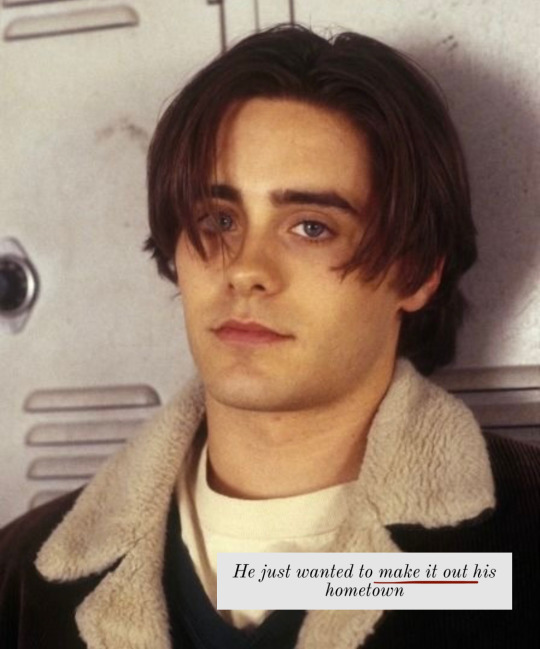
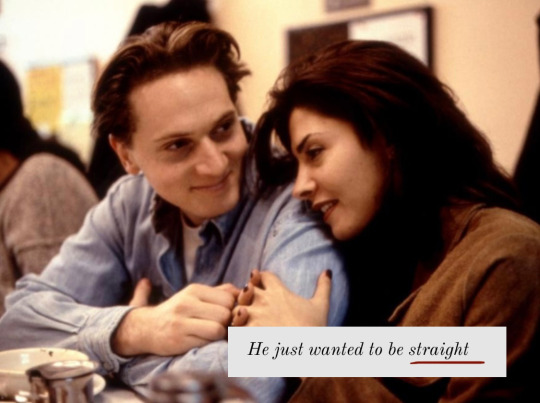
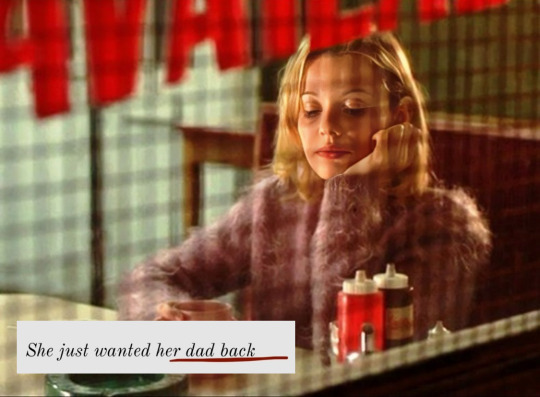

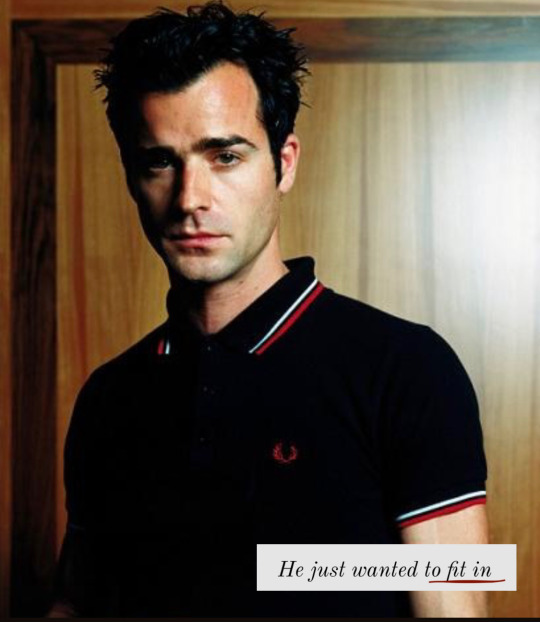
(INSANELY LONG) (LIKE INSANELY) (YOU HAVE BEEN WARNED) EXPLANATIONS BELOW
(And If you have hc’s feel free to share!)
Patrick: cmon. The entire plot of AP is literally him just begging to be noticed.
Bro is devoid of attention right until the very last scene (aka the one with his lawyer). Sorry to all the SiGmA mALe AMPS fans but this is not a “sigma 🥶”, this is a man who did not receive a MORSEL of affection during his formative years.
His obsession with ‘fitting in’ (ie being accepted and therefore cared about) through his clothes, his looks, his social circle; his outbursts of intense emotion and inability to regulate them (almost as if he was never taught how to do so); the way he views the women in his life in an almost maternal way (namely Evelyn and Jean) - he just needs a hug!!!
And some intense therapy. And heavy duty psych meds.
Paul: this one is partly canonical, partly not.
The way that his character is almost revered by the other guys at P&P is interesting; he comes over as this über cool, competent, successful finance bro almost to a greater extent than they think they are.
But then he gets drunk with Patrick away from the office and from the constraints of corporate professionalism and becomes this silly goofy little guy.
I don’t necessarily think his work ‘persona’ is an act: I think it’s the parts of himself that he has to accentuate in order to succeed.
Also - I took influence for this from the amazing Paul character studies written by my dear friend @leoblooms on AO3 - please check them out
Luis: this one is pretty self-explanatory.
He’s the only confirmed canonically queer character in AP (although, come on, Patrick’s canon closet is made of glass at this point). And yet - in a way that so many LGBT+ people have suffered with throughout history and sadly even to this day - he can never, ever show it. Being openly gay in his environment would make him a social pariah.
Instead, he has to fit in: he’s marrying a woman, he’s acting like ~one of the guys~, he’s hoping that he can suffocate that part of himself by burying it six feet underground. But as so many of us know all too well: you can’t hide who you are forever. The bathroom scene with Patrick just proves this.
I also wanted to make a note of this because it’s very interesting to me - I read the most AMAZING fic a couple of years ago that was written from Courtney’s perspective, and in it it was mentioned that Luis is Catholic. I’m a Christian as well (from a famously progressive denomination) and although a lot of attitudes are changing within the Catholic Church, particularly right now, the ‘gay = sin’ mentality does prevail for many.
So it makes sense that if Luis was raised Catholic he has been suppressing that part of himself for a very long time. I can see him lying to himself and having girlfriends in high school.
Courtney: my literal baby girl. I’ve written a whole 18k character study on her because I find her so canonically fascinating.
My headcanon is that her father was absent from her life from a young age - but this is rooted in how she actually acts in the source material.
In the boardroom scene, Luis thanks Patrick for “taking care of Courtney last night”. To me, it sounds like he’s taking on a role that’s almost paternal. She is also notably reliant, and almost clingy, on the men in her life: telling Patrick she can’t go out because she’s waiting for Luis to call, and practically begging Patrick to call her after they’ve slept together.
Additionally there’s the whole ‘fucking my best friend’s boyfriend’ thing - I’m getting WAY off topic here but I see so much of her in Cassie from Euphoria. Unless someone is purposefully malicious and nasty, I think there’s always a reason for that kind of thing, even if it is complex and unsavoury.
I hate to use the term “daddy issues” because it absolves absent/abusive fathers of all of their damage and unfairly places the blame on young women, but if I had to describe a reason for why she might act in this way - having seen it first-hand myself from many people - that would be it.
Evelyn: so I did take some influence from Reese Witherspoon’s character in Legally Blonde here - but I think Evelyn is actually one of the smartest characters in AP and so I feel it’s fitting.
She comes over as incredibly ditzy and shallow, but remember we’re seeing and reading all of this from Patrick’s perspective - of course he’s not going to have a high opinion of her, because…it’s Patrick Bateman were talking about here.
In reality, she’s probably one of the most socially clued-in characters. For example: she effortlessly hosts big gatherings with grace and decorum even if the majority of guests are, let’s be honest, fucking insufferable.
She’s also the only character who can actually handle Patrick and meets him on his own level. She absolutely refuses to take any of his bullshit (“what am I supposed to do with that? Floss with it?”).
Her actions and force prove her to be the strong willed and savvy and to me that suggests intellect, as much as it may be hidden - again, due to the environment she exists in.
Bryce: he’s so interesting.
I’ve not written as much about him in my fics as the others, but his actions in the source material suggest that underneath his finance bro Wall Street image, he’s someone who’s very disillusioned, and almost broken.
I really wish the scene of his…episode?…in the club hadn’t been cut from the film. I’d recommend anyone to watch it (and the rest of the deleted scenes because they’re class) if they’ve not seen it already.
There’s also The Informers, the book and film adaptation of another of of Bret Easton Ellis’ works, which features a young Tim Bryce (referred to as Price) and the complex relationship with his father. I’ve not read/watched it in full yet, but whilst they’re on holiday Bryce’s father gets drunk and acts lecherous and gross towards young women on the beach, and Bryce is disgusted by this (perhaps he’s not as much of a raging misogynist as his peers?), and then makes ‘joking’ comments about Bryce being the subject of attraction by other men, to which Bryce walks out on him (perhaps he’s less condemning of homophobia than the others? Or, possibly…maybe he has less than hetero feelings himself? Not to spoil any of Mergerizations but I headcanon him as bisexual tbh).
This behaviour suggests that, at least as a teen, Bryce was very assertive of what was and wasn’t okay and was happy to make these views known.
But due to bullying by his father and, again, the environment that he likely grew up in, he has to suppress this part of himself to be accepted.
WOWWWW that was a whole ass essay. If you’ve read to this part, 1) I’m sorry 2) THANK YOU 3) I love you!!!!
#american psycho#patrick bateman#american psycho memes#bret easton ellis#mary harron#christian bale#gay#lgbtq#patrick bateman x paul allen#paul allen#lesbian#biseuxal#trauma#childhood trauma#daddy issues#character study
49 notes
·
View notes
Note
i've been hearing a lot on anti-psychiatry/reframing diagnosis and symptoms/etc (including from your blog) but i feel like im missing a baseline of information to delve in that discussion. do you know some good sources to learn the 101 of what psychiatry is, how diagnoses are "discovered"/labeled, etc...?
before hearing about the subject i assumed mental illnesses/disabilities were the result of a recognizable cause (in the same way covid is caused by contact with the virus, or some form of blindness caused by problems with the optic nerve) but it seems that is not the case.
also, not a native english speaker, don't know if im using the correct vocabulary for this.
before hearing about the subject i assumed mental illnesses/disabilities were the result of a recognizable cause (in the same way covid is caused by contact with the virus, or some form of blindness caused by problems with the optic nerve)
this is a very common misconception, and one that's very useful for the legitimation of the discipline of psychiatry. in truth, genomics and neuroscience have not identified a biological cause of any psychiatric diagnosis (p. 851). psychiatric diagnoses are not made on the basis of neuroimaging or neuroanatomical differences (none have been consistently or strongly observed as defining or causal characteristics of such diagnosed conditions, and neuroimaging datasets, such as by fMRI, are prone to be interpreted in highly varying ways by different researchers), nor with bloodwork or indeed on the basis of any other biomarkers; the 'chemical imbalance' theory of diagnoses like depression has been thoroughly debunked. instead, these diagnoses depend on clinicians' observations of patients' behaviours and affect. this in itself doesn't automatically constitute a damning critique (we rely on subjective judgments of things all the time), but it does mean that attempting to stake the psychiatric discipline's legitimacy on the identification of biological aberrations is at best misleading at and worst fraudulent, not to mention essentialist.
none of this means that psychiatry or psychiatrists are 'making up disorders from nothing', or that people's distress / symptoms are unreal. psychiatry certainly can and does pathologise behaviours that would be more productively understood as responses to traumatic experiences, capitalist political conditions, social oppression, &c; in these processes, it should be understood as a means of producing bourgeois notions of social order & then enforcing them. the fact that psychiatric diagnoses are not made on the basis of, nor do they correspond to, specific biomarkers or biological 'types', doesn't make mental / emotional / affective suffering any less 'real' than any physically observed counterparts.
as for texts that will give you some groundwork on psychiatry, i would recommend Anne Harrington's Mind Fixers: Psychiatry's Troubled Search For the Biology of Mental Illness (2019) and Andrew Scull's Desperate Remedies: Psychiatry's Turbulent Quest to Cure Mental Illness (2022) and Psychiatry and Its Discontents (2019). all three of these are heavily focussed on the usa, which is generally overrepresented in historical and sociological literature on psychiatry; however, i still think these three texts are useful starting points for getting introduced to the history of psychiatry and broad contours of critiques of the discipline. i've also posted a longer anti-psychiatry reading list that has more texts focussed on other national and international contexts.
296 notes
·
View notes
Text
shit I'm going through my over 700 drafts and a number are responses to anons.
I'm learning to respect my natural prerogative as a human being to be messy but it's instinctually embarrassing to have all these responses to people who stuck their necks out in sending something to me, only for me to write a paragraph and lose confidence or something and then carry out my day. I don't like myself for it.
The thing is, it's either I Follow The Obligation and then crash and burnout and never want to touch tumblr again, or I let these things happen, sit with the feeling and let it inform my future decision making, like a Normal Human Being. And this kind of process tends to happen when you're like, a teenager/young adult, not when you're literally over 30. My commitment to Obligation left me genuinely emotionally stunted and I'm crashing now into what being a mature adult actually feels and looks like.
I find it funny how trans-identified people say they're going through a 'second puberty' as they 'discover their true selves' because honey, I'm literally doing that - I'm the living embodiment of the kind of process they're talking about. I didn't know I had a personality until like 3 years ago. I was an overly responsible teenager and only now do I feel like an actual one, except now I don't get any breaks for fucking up. And yeah that sucks, yeah I mourn not feeling young and I mourn that I never got the luxury of living through mistakes during my formative years, but part of maturity also involves sucking that up, too. I'm not owed a perfect life, after all.
But this does leave me in this very odd position where I'm trying to balance out allowing myself to be a messy human being but also acknowledging that maturity means sucking things up. I still haven't quite been able to find this balance and probably never will, because this isn't naturally a process you do manually over 30. I admit that everyone does an element of it manually - true maturity doesn't happen without some element of manual choice, because otherwise it's not true maturity imo - but as with everything I'm doing the extreme version. And I'm extremely, uncomfortably, self-aware throughout. That, like everything else, I've found is easier to accept as part of life as opposed to obsessing over it being Unfair.
One small thing I've noticed is that the lifestyle I've found most comfortable since starting this journey is one that most closely matches what people call 'ADHD'. I'm not sure what to make of that: I definitely wasn't this way as a child. And I feel like this need to jump from thing to thing is much more a product of aversion therapy to Obligations than anything else. And it makes me wonder just how much other people's 'ADHD' has something similar as its origins, except they're less self-aware about it. Or, as I keep wondering, does simply recognising its origins not mean anything - after all, I now understand the origins of my depression, but that doesn't mean I don't recognise and value its shorthand. Knowing where my ADHD-like symptoms come from doesn't rule them out as being 'real' ADHD. But does the fact I was able to live without succumbing to those symptoms mean that it isn't ADHD? The ultimately rhetorical question always comes back to where do you draw the line between 'mental disorder' and just 'having a personality'. And it is rhetorical because in the end, part of me recognising my prerogative as a human being is that I can't be perfect - not being able to do everything perfectly doesn't necessitate slapping a pathologising label onto it. My major suspicion about the rise in diagnosis mental disorders is because there are way more ways to disappoint people and screw up your life than there used to be, so more people are feeling the 'Tug of Obligation' from all these various sources. like years ago people didn't have to check their emails and respond to that friend for coffee over text and cancel that subscription to netflix and and and - with the Obligations piling up, if you can't fit all that shit in your head you superficially look less functional, so it's easier to just label yourself 'ADHD' whenever you forget to respond to yet another message from a friend. It allows for you to acknowledge You Care but also write it off as A Problem rather than just your personality being pushed to its limits.
What I truly want to say in situations like this is: I have a weird bunch of 'problems' in my head that are functionally indistinct from having a personality, and if I wasn't so self-aware you'd just shrug it off as an annoying personality quirk, but since I am self-aware I now seem like way more of an asshole by saying 'yes I know didn't respond to your message and in all likelihood unless some chance chemical reaction happens in my brain I probably won't ever respond in a way I'm happy with, and since I care more about some instinctual feeling of 'correctness' according to some obsession my subconscious has, which in itself could simply be a product of having a personality - and honestly I could keep going into even more granular detail, expressing even more nitty gritty aspects of myself until I've left my entire soul up for Judgment By Peer Review'. The tempation is for me to be apologetic, especially in the way women are expected to. My entire Disorder is centred around this exact issue - that I am not 'allowed' a personality - and the more self aware I become, the less excuses I have, and the more I owe people an explanation, an apology, for the very fact that I'm human at all. The fastest and easiest way to communicate this is to pathologise myself, saying I'm planning on getting myself diagnosed for ADHD, that I have my 'Obligation' disorder - whilst that may be true in the sense that we use language as shorthand, I now recognise what saying such things at all communicates to me about myself. I now want to preserve my dignity, to allow myself to 'be messy', to not force myself to be perfect, and unfortunately that means I'm going to miss things and forget things - and to see myself do those things, feel uncomfortable about them, but do them anyway, and sometimes not apologise, or apologise in the 'normal way'. Hearing a piece of information and recognising 'I'm going to forget this' is a very, very odd feeling.
I still don't know what standard I want to hold myself to - since I now have to concede that the standard I once held myself to wasn't me Channeling Logic From The Universe but rather a product of my own ethics, I now I have to decide how much of those ethics I actually want to adhere to without destroying myself. And there is no line here. Someone will always call you out for something. And being aware that I'm crossing that line will always make me seem worse than if I was oblivious. But that's just basic logic, no? Eating unhealthily when you don't know it's bad for you is just ignorance, eating unhealthily when you do know it's bad for you is irresponsible.
I think about this whole thing a lot and would have written a Proper post about it but I actually think the messy stream-of-consciousness post about this is actually quite fitting and poetic.
6 notes
·
View notes
Text
Throughout the past few decades, some psychiatrists and psychologists have dealt with the borderland between psychosis and mysticism. In the 1960s and 1970s psychiatrists R. D. Laing and John Perry became famous for antipsychiatry crusades; both accused their profession of pigeonholing the psychotic as diseased and thus fundamentally different from, and inferior to, so-called normal people. A schizophrenic may indeed be mad, Laing has said, but he is not ill. The mind as a whole—including the unconscious, the place of dreams and phantasms and the source of awe—is like an ocean, of which the ego remains mostly ignorant. But a psychotic is in touch with it: he is swimming (one might say drowning) in it. He is not out of his mind but, in fact, in his mind; we, the sane, are the ones who are out of our minds, or rather out of touch with most of our minds, in that we can’t access them. The psychotic is thus on a profound, dangerous, mystical voyage whose purpose is to find new, deeper ways to communicate. The psychotic isn’t content with the ordinary ways of knowing that the ego offers, any more than the religious mystic is. By looking at psychosis as a mere illness, these thinkers said, psychiatry misses the whole point of the affliction: that it is ultimately an attempt to find deeper meaning …
As an example of this new approach, at Oxford University in the early 1990s, five thousand psychotic and religious experiences were studied and analyzed for features of both psycho-pathology and spirituality. One of the findings was that the way an experience is treated by others influences how the subject deals with it. According to British pastoral counselor John Foskett, "If they were listened to and accepted, individuals found ways to integrate even the most disturbing ideas and emotions. If they were ignored or pathologised by others then the trauma was aggravated." Foskett added that "a purely psychiatric approach which explains [the experiences] in terms of dysfunction may actually be instrumental in producing pathological syndromes."
— Russell Shorto, Saints and Madmen
4 notes
·
View notes
Text
ughhhh i'm fucking shocked about what my therapist said to me a few days ago. i just happened to mention my gf's brother who is autistic (like me) and i just mentioned stuff like yeah he likes math and board games but didn't really even tell her about what kinda stuff he struggles with. and then she goes "oh so he's more severely autistic than you." BRO WHAT??????
yeah he is most definitely more stereotypical than me bc you know he's a nerdy cis white guy but like WHAT????? just bc someone is a nerd who likes fucking MATH AND BOARD GAMES you can't really deduce "how autistic" they are??? and how dare you call him "severely autistic" that's so fucking offensive. how dare you call someone's whole fucking existence "severe." he's literally just chilling. yes he has struggles (the same kinda struggles as i do!!!!) but he's doing kinda well actually. AND WHAT DO YOU EVEN KNOW I JUST MENTIONED MATH AND FUCKING BOARD GAMES
and like what the fuck was the point even. i've been talking about my autism with her for like 2 years and she knows exactly what kinda stuff i struggle with. and i struggle A LOT. but then she feels the need to compare when there's some guy with nerdy interests??? what is even the point? what is the deduction? finish your sentence? he is more "severely autistic" SO...? what is your point that you're trying to make????
it's like she was trying to diminish my struggles with comparing me to someone whose struggles seem "more severe" than mine. but it's not like my gf's brother even has more struggles than me lmao (i think on average me and him have the same amount of struggles he just presents more stereotypically....) and even if he had more struggles than me??? it's kinda weird that you mention it like that? why do these allistic health care professionals always feel the need to bring up higher support needs autistics in such a weird and pathologising way?? like "at least you're not like THOSE autistics." do you not realize how fucking dehumanizing that is?? like did you not know that higher support needs autistics do have thoughts and feelings and they would probably not appreciate being spoken about in such a pathologising manner. i shouldn't have to say this out loud!!!!
yeah i'm not only mad bc of myself but also bc she kinda revealed how she feels about the whole autistic community. which is fucking incredible. like she knows that I KNOW a lot about autism and i've been even educating her about it. she even read my thesis which was about attitudes and stereotypes towards autistic ppl and THIS IS EXACTLY the kinda stuff i was criticizing!!?? did you even read the paper???? it had like 60+ scientific sources and she still feels the need to go "achshually this person has to be this and that just because i perceive them this way 🤓☝️" i'm shocked. i'm angry.
3 notes
·
View notes
Text
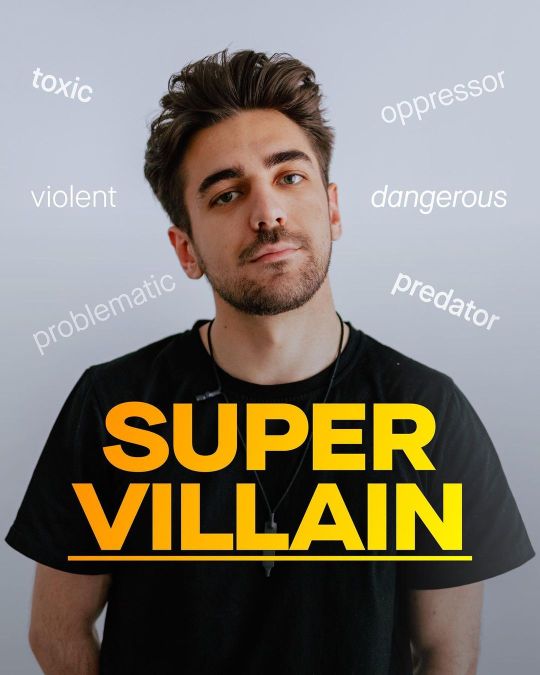
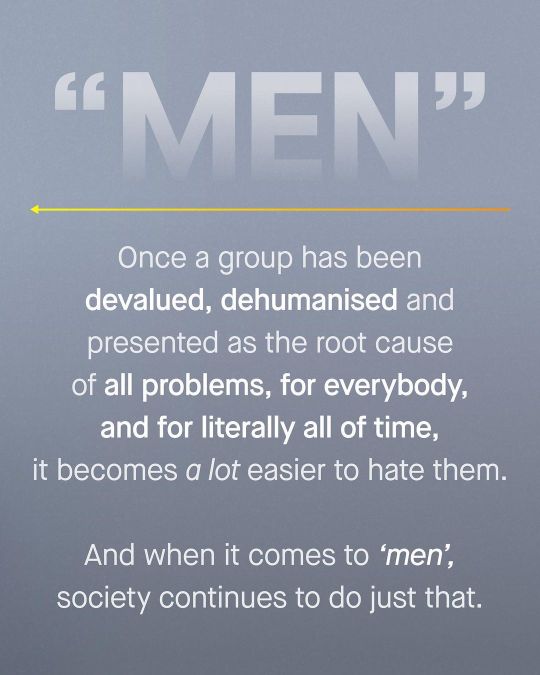
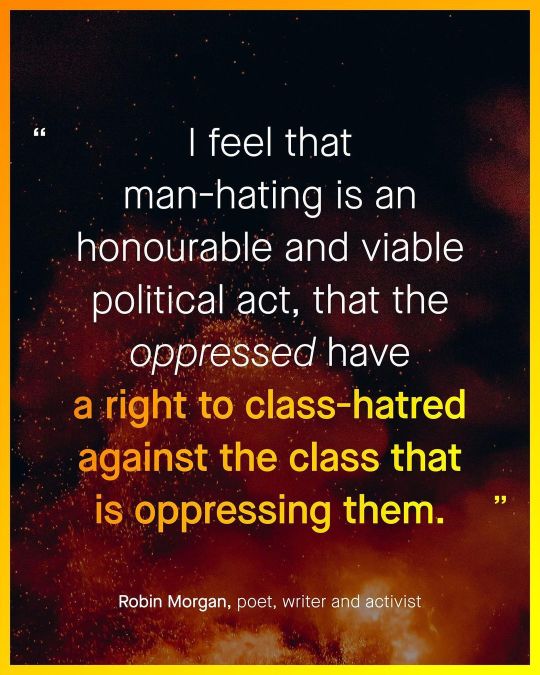
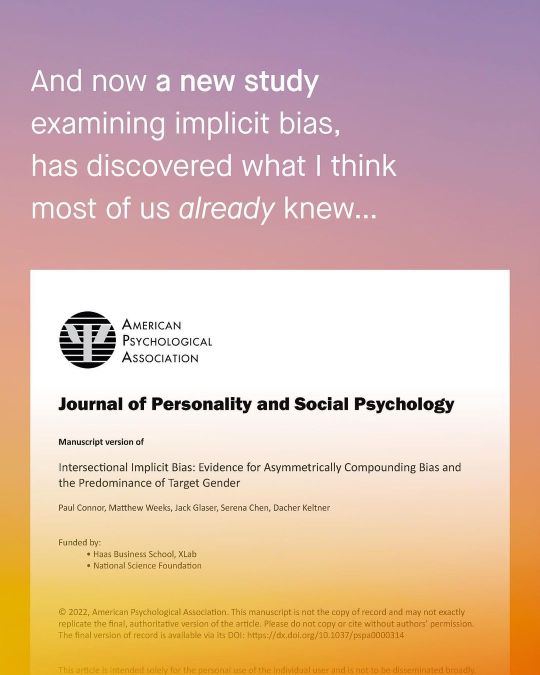
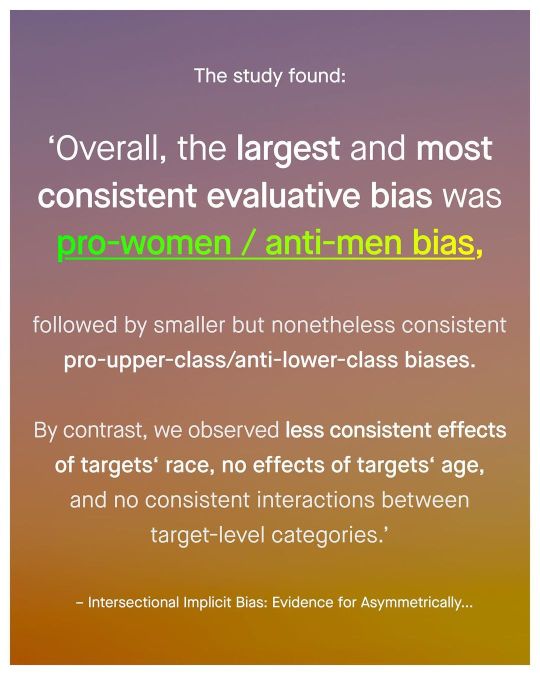
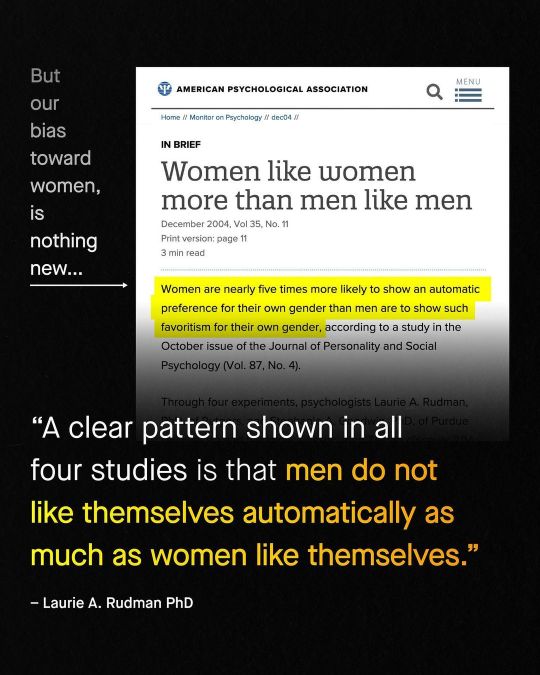
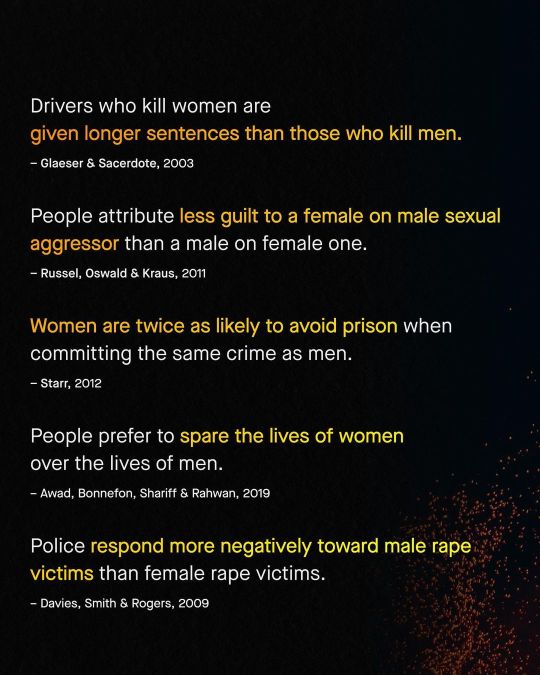


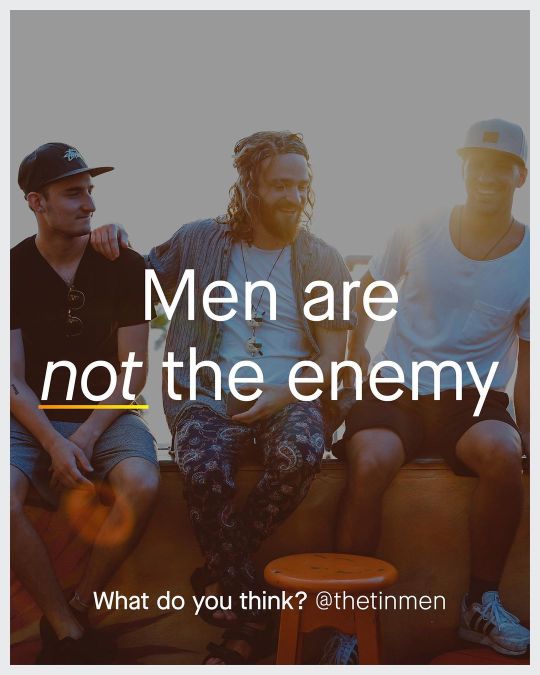
Whilst I try to enter every conversion with an open mind, I won’t lie, whenever someone starts talking about ‘patriarchy’ this, and ‘toxic masculinity’ that, I roll my eyes and find myself acting as a parent would, when their child once again grabs hold of the microphone, to unleash a diatribe of incoherent babble.
I hear reductive, meaningless, and shame-laden neologisms pepper discourse, stoke division, and erode the value and mental health of men and boys.
I watch as we routinely and systematically deride ‘men’, and name everything bad in the world after them.
How we insult and gaslight men, pathologising innate parts of who they are as ‘toxic’, to be expunged, exorcised or corrected.
We frame men as collectively responsible.
We blame them for things they never did and are horrified by.
This slow drip of such hateful ideas naturally impacts the group consciousness of society, who have now learnt to dislike men too; including men, who continue to take their own lives in record numbers.
And whilst this ‘men vs women’ narrative might sell your angry book, look great on a placard, or shift tickets to expensive ‘positive masculinity’ workshops where the self-righteous flagellate themselves, and proselytize, with whines and crocodile tears – such ideas have little efficiency in the realm of real life.
Such ideas don’t work. Such ideas often make things worse.
They make little sense and are thankfully rejected by most of the world.
Still, damage is being done, and ought to be discussed.
So, what do you think of the profile of men, now found to be the most disliked demographic of all?
And what can we do to reframe people’s minds to value, treasure and respect men, as we do women?
What do you think?
--
Sources:
Study: "Intersectional implicit bias: Evidence for asymmetrically compounding bias and the predominance of target gender"
Center for Male Psychology: "Landmark research study finds clear evidence of pro-women/anti-men bias"
Supplementary studies:
"'Women are wonderful' Effect"
"Sentencing in Homicide Cases and the Role of Vengeance"
"Evaluations of sexual assault: perceptions of guilt and legal elements for male and female aggressors using various coercive strategies"
"Estimating Gender Disparities in Federal Criminal Cases"
"The Thorny Challenge of Making Moral Machines: Ethical Dilemmas with Self-Driving Cars"
"Police Perceptions of Rape as Function of Victim Gender and Sexuality"
==
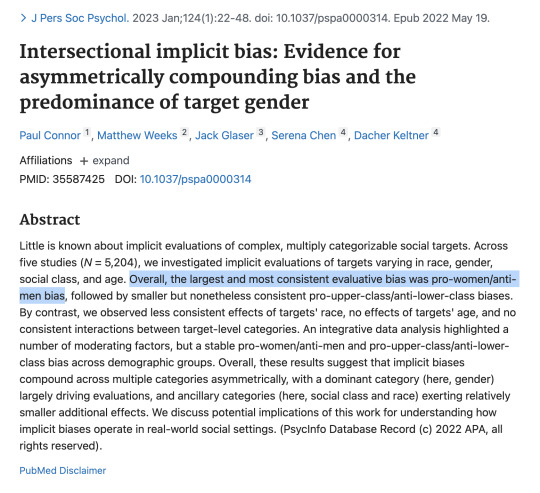
Bonus study: "Worth the Risk? Greater Acceptance of Instrumental Harm Befalling Men than Women"
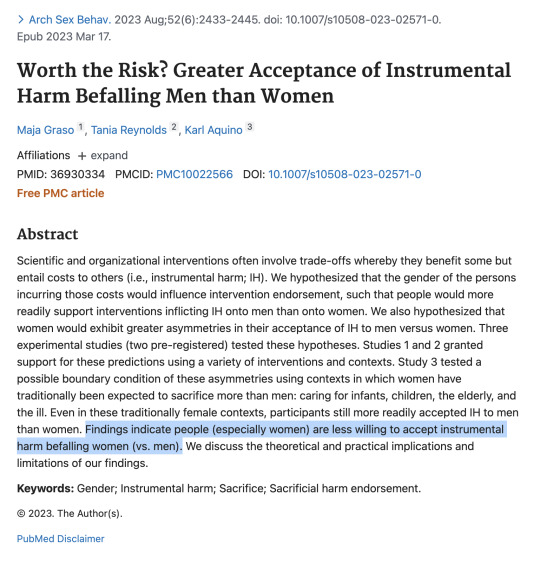
==
Nobody who lives in a western country lives in a "patriarchy."
As evidenced by this very simple question: who are you allowed to criticize and villainize with impunity, with no expectations of repercussions?
If you lived in an actual "patriarchy," you couldn't complain about the "patriarchy." You'd suffer government and societal repercussions. Like Iran, Saudi Arabia or Afghanistan.
Pretending you're the same makes you vile and repugnant. Western women are the freest, most self-determining, prosperous people who have ever walked the face of the planet at any time ever.
#The Tin Men#anti male bias#anti male#misandry#pro female bias#pro female#women are wonderful#women are wonderful effect#toxic masculiity#tHe PaTriArChY#western feminism#male disposability#gynocentrism#religion is a mental illness
13 notes
·
View notes
Note
genuine questions: what are your credentials? do you have a biology degree? because you use basic language and seem to have a loose/rudimentary understanding of biology. not only that, your content is interestingly pathologising anything that isn't your idea of the 'norm'. if you have further education on biology, who are the biologists you study under? can you cite some papers please? i want to see what your sources are (ideally harvard but APA is fine also) if we are to have a "healthy debate". thanks for your time
I’ve answered this before. But my degree is a Bachelors of Arts in child development with a minor in child psychology. I took the necessary biology courses required for my degree.
1 note
·
View note